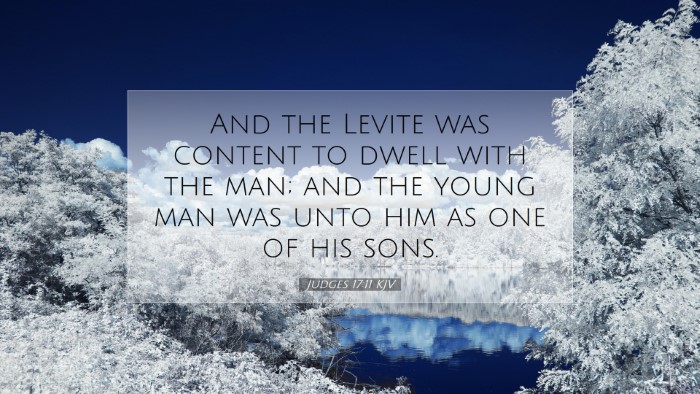Old Testament
Genesis Exodus Leviticus Numbers Deuteronomy Joshua Judges Ruth 1 Samuel 2 Samuel 1 Kings 2 Kings 1 Chronicles 2 Chronicles Ezra Nehemiah Esther Job Psalms Proverbs Ecclesiastes Song of Solomon Isaiah Jeremiah Lamentations Ezekiel Daniel Hosea Joel Amos Obadiah Jonah Micah Nahum Habakkuk Zephaniah Haggai Zechariah MalachiJudges 17:11
Judges 17:11 KJV
And the Levite was content to dwell with the man; and the young man was unto him as one of his sons.
Judges 17:11 Bible Commentary
Commentary on Judges 17:11
Judges 17:11 states, "And the Levite was content to dwell with the man; and the young man was unto him as one of his sons." This verse presents a significant moment within the broader context of the Book of Judges, highlighting themes of loyalty, identity, and the struggles of spiritual leadership in Israel.
Overview
The narrative in Judges reflects Israel's moral and spiritual decline during the time of the judges. This specific verse captures a Levite's willingness to forsake his priestly responsibilities and align himself with Micah, a man openly practicing idolatry. The implications of this relationship provide significant commentary on the nature of faithfulness amidst corruption.
Insights from Matthew Henry
Matthew Henry emphasizes the Levite’s character and choices, noting that he abandoned his rightful duties, which were to serve God in the sanctuary. Henry observes:
- Personal Convenience over Divine Call: The Levite represents a troubling trend where personal convenience leads individuals away from their divine calling. He sought not true worship but a comfortable living.
- Degradation of Worship: Henry points out that Israel faced a deterioration of true worship, evidenced by the Levite's decision to live with Micah. This seeks to illustrate how spiritual leaders can be complicit in idolatry.
- Relational Dynamics: The relationship between Micah and the Levite indicates a dangerous intimacy with false worship that was not sanctioned by God.
Insights from Albert Barnes
Albert Barnes offers a keen historical analysis, describing the Levite’s actions within the socio-religious context of the time:
- Status of the Levites: Barned asserts that many Levites were watching their roles diminish and felt compelled to seek alternative means of support amidst the chaos of the times.
- Idolatry as a Social Norm: The Levite's willingness to remain with Micah signifies a broader cultural acceptance of idolatry. The Levite's role symbolizes the blending of genuine worship with pagan practices.
- Fatherly Role: The text describes the Levite as gaining the affection of Micah, implying a paternal bond that potentially overlooks the spiritual dangers involved in such associations.
Insights from Adam Clarke
Adam Clarke brings forward a critical reflection on the verse's implications for both worship and community life during the period of the judges:
- Desire for Acceptance: Clarke suggests the Levite's acceptance within Micah’s household points to an inherent human desire for validation and belonging, regardless of moral implications.
- Critique of Leadership: Clarke criticizes the Levite's moral failure, illustrating how spiritual leaders can mislead their followers through selfish actions that appear accepting at first glance.
- Identity Crisis: The verse reveals an identity crisis among the Levites who should have been the guardians of faith, demonstrating how the societal collapse leads them to abandon their roles.
Theological Reflections
The analysis of Judges 17:11 leads to several theological reflections:
- Faithfulness in Crisis: How do leaders maintain faithfulness during crises? This verse challenges pastors and leaders to remain steadfast amid societal decline.
- Spiritual Compromise: The Levite's actions exemplify how easy it is to compromise one's faith for personal gain. It serves as a warning for contemporary believers who face similar temptations.
- Understanding Relationship with God: The familial terminology used in this verse raises questions about how relationships should be defined within spiritual communities. Are we nurturing our spiritual 'sons' and 'daughters' in true worship?
Lessons for Today
Judges 17:11 provides contemporary believers with various lessons:
- Evaluate Leadership: The church must evaluate its leaders and ensure they are committed to spiritual zeal and moral integrity.
- Encourage True Worship: Believers are called to foster environments that promote true worship rather than idolatry, which can often take subtler forms in modern contexts.
- Community and Accountability: This narrative emphasizes the importance of community. It reminds us that our choices affect not only ourselves but those around us.
Conclusion
Judges 17:11 stands as a poignant reminder of the challenges faced by spiritual leaders amidst moral and ethical decline. By reflecting on the insights of historical commentaries, contemporary leaders and students of the Bible gain valuable understanding of the intricate dynamics of faith, identity, and community. It urges us to remain faithful to our calling, recognizing that our decisions shape not just our paths, but also the spiritual health of those we lead.


